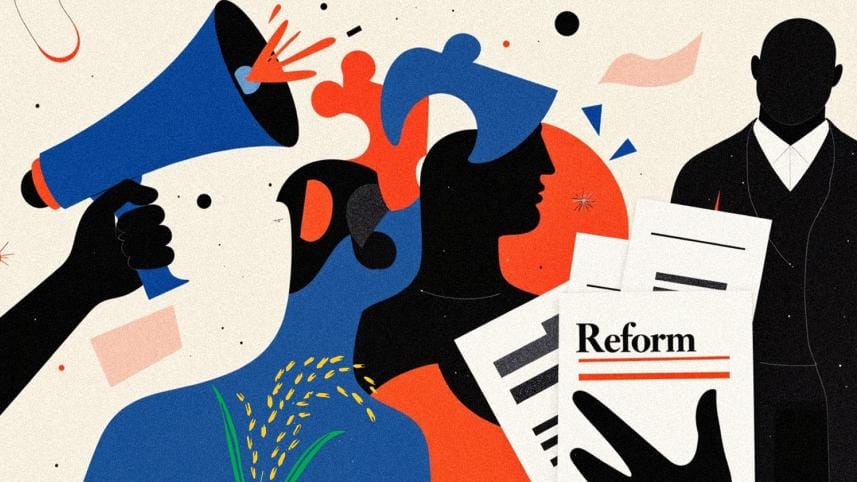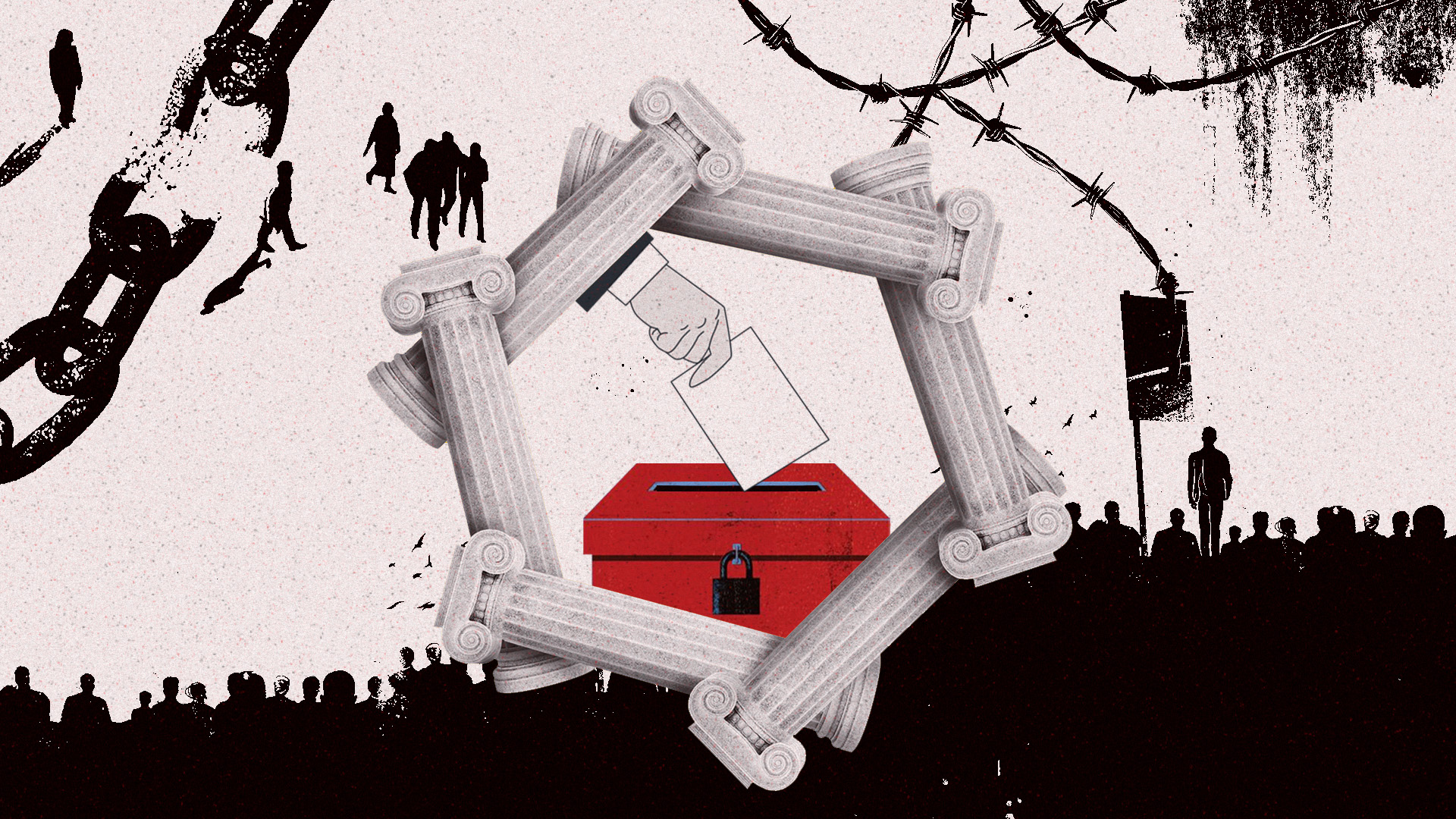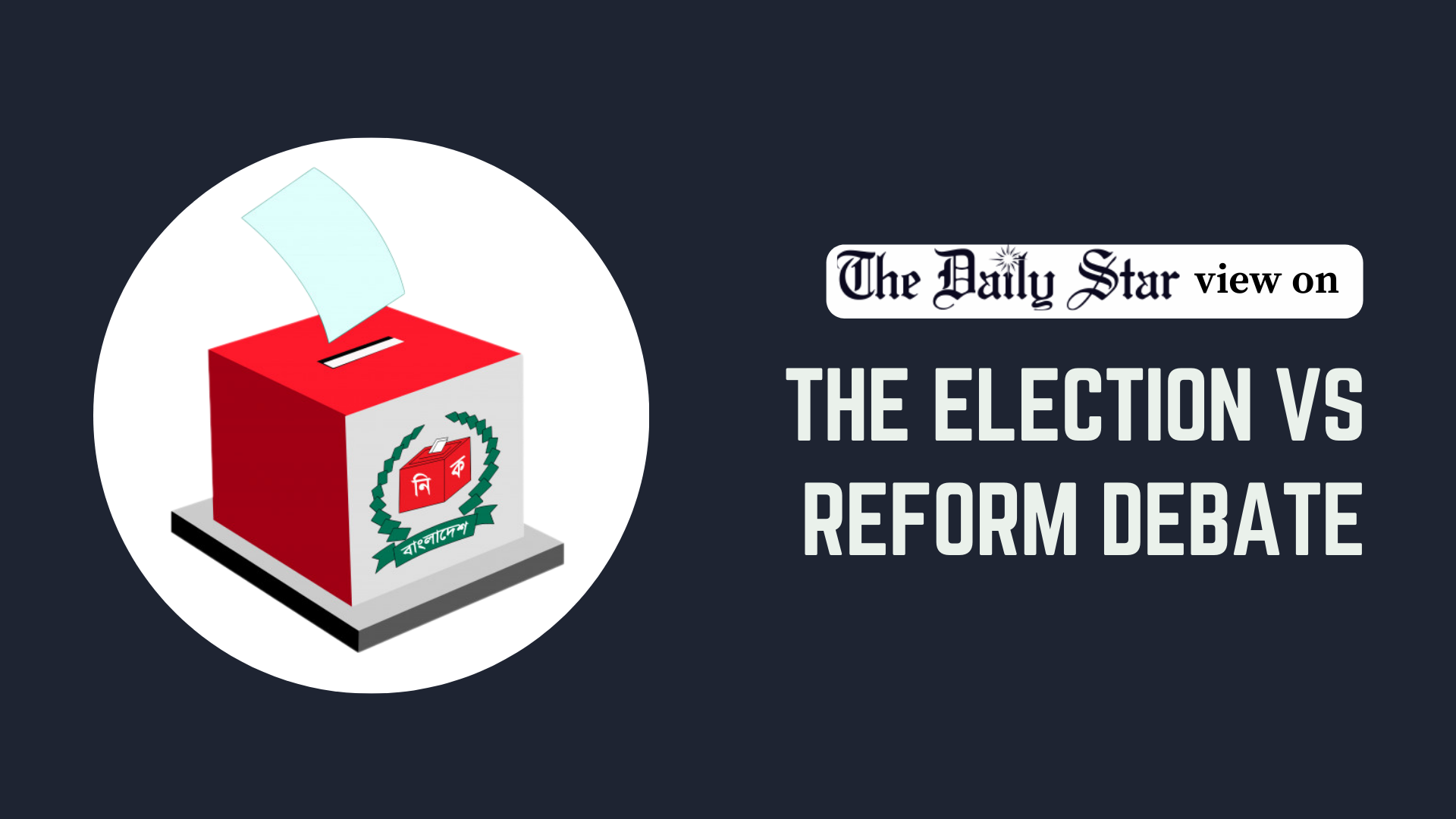The more BNP talks about reforms, the less convincing it sounds

Going solely by its public statements, an interesting aspect of BNP's activities since the July uprising has been its search for—and interaction with—new adversaries, in the absence of the one it fought against for so long. As new forces emerge on the scene, BNP, driven partly by post-uprising realities and partly by an abiding sense of victimhood, has increasingly found itself at odds with former allies, new parties, student leaders, the chief adviser and his cabinet colleagues, and even media houses critical of its unruly activists. And it has sought to use these conflicts to come out stronger. What's interesting about it is how unchanged BNP's manner of engagement has remained despite the political changeover in August, often adopting an adversarial tone that feels too eager at times.
In his seminal work on the politics of enemies, Canadian historian Michael Ignatieff explains that when politicians target their adversaries using inflammatory rhetoric, it is not necessarily true that they are merely representing their constituents' feelings or responding to injustices and societal divisions. "The truth may be darker: it may be a language game not to represent grievance, but to create it, and to polarise for the sake of political advantage." However, as the largest party at present—and one many expect to win the next national election—BNP's adversarial politics hurts more because it was expected to lead a new culture of politics, with a new political language that seeks mediation rather than confrontation.
Be that as it may, where it gets particularly disturbing is when BNP brings its combative approach to the state reform drive, which the nation hopes will be the catalyst for transformational change in the country. BNP's stance on reforms has long been one of confusion and mixed messages. On March 16, however, it seemed to take it a step too far. Speaking at an iftar programme at Dhaka Medical College, senior BNP leader Mirza Abbas said, rather ominously, "We will not easily accept any reforms dictated by their [interim government's] hands or pens. If they carry out reforms, we will make corrections. BNP, in collaboration with other political parties, will determine those corrections and present them to the nation. We will not accept the so-called reforms led by the so-called intellectuals who are not even citizens of this country."
BNP must recognise that, besides electoral changes, there are other reforms that are of equal priority. Our painful history of political violence and corruption demands that some key changes be made—at least in the judiciary and police force—to ensure Bangladesh doesn't return to the pre-July status quo after elections. The idea that this may not happen is both naïve and dangerous.
This statement is striking for two reasons. First, it outright dismisses the proposals from various reform commissions which, by the way, are with the political parties for review. Second, it openly questions the legitimacy of those who prepared the proposals and are in talks with stakeholders, including the BNP, to achieve consensus on the nature and extent of reforms. But if this is how BNP wants to navigate this crucial phase—by pre-emptively rejecting expert proposals, disparaging those involved, or accusing the "unelected" government of trying to favour certain parties—what was the point of all the efforts over the last seven months? The non-citizen jibe, likely aimed at the National Consensus Commission Vice-Chairman Ali Riaz, who also heads the Constitution Reform Commission, was particularly insensitive. Despite BNP being very much on the inside and having the ability to impact outcome through the ongoing dialogue, such public outbursts create confusion about what it truly wants.
Yes, not everything said to rally party loyalists should be taken at face value. But BNP's reaction cycle—from insisting that elections and reforms should progress in tandem to demanding no reforms beyond those related to elections—is well-documented. The party has itself complained that its commitment to reforms is being unfairly questioned, but stopped short of considering whether it is somehow contributing to this perception. Instead, it appears more interested in its own 31-point charter, which largely consists of broad visions. All this suggests BNP's growing alienation from the aspirations for structural change through the ongoing reform drive. While acting chairman Tarique Rahman's statement on Wednesday—warning that extremists and fascists could again "bury democracy" and expressing BNP's commitment to maintaining the country's secular character—is laudable, it's the grunt work of reform-making where its commitment, and support, are most needed. Right now, its critical stance isn't helping. Ali Riaz appeared to hint as much on Thursday when he stated that both internal and external forces are trying to "obstruct the reform process."
BNP must recognise that, besides electoral changes, there are other reforms that are of equal priority. Our painful history of political violence and corruption demands that some key changes be made—at least in the judiciary and police force—to ensure Bangladesh doesn't return to the pre-July status quo after elections. The idea that this may not happen is both naïve and dangerous. To expect a political government to honour its commitment to reforms is like expecting it to honour its election manifesto, and we all know how faithful past ruling parties were to their manifestos. There must be at least some binding mechanisms or safeguards in place to ensure that the reform drive does not derail after elections. One way, as suggested by a columnist in this daily, would be for political parties to "thrash out a common minimum reform programme (CMRP)—a set of core reforms based on the max-min principle, where the maximum number of parties agree on a minimum set of urgent measures." This is precisely what the National Consensus Commission can help achieve, if given proper support.
If the BNP really wants to be seen as a pro-reform force, it should engage in these discussions with greater sincerity, sending an undiluted message of solidarity with whatever outcome this process yields. At the same time, it should balance its political aspirations with the broader national interest. That goes for all other parties as well. Any attempt to politicise the reform drive—whether by questioning and obstructing the process or by selectively endorsing reforms that suit their interests—will serve neither the parties nor the country in the long run.
Badiuzzaman Bay is assistant editor at The Daily Star. He can be reached at badiuzzaman.bd@gmail.com.
Views expressed in this article are the author's own.
Follow The Daily Star Opinion on Facebook for the latest opinions, commentaries and analyses by experts and professionals. To contribute your article or letter to The Daily Star Opinion, see our guidelines for submission.




 For all latest news, follow The Daily Star's Google News channel.
For all latest news, follow The Daily Star's Google News channel. 


Comments